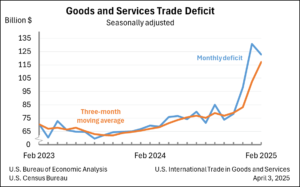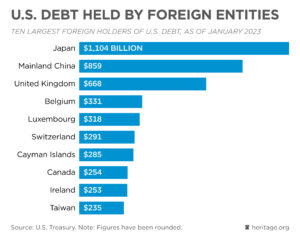- Categories :
- More
Do Trade Deficits Really Matter? A Closer Look at the Global Ripple Effects

In the world of global economics, few topics get as much airtime, and as much misunderstanding, as trade deficits. At Avion Wealth, we believe our clients deserve clarity, especially on issues that could impact investment performance. So, let’s unpack the reality behind trade deficits and why they may not mean what you think.
What Is a Trade Deficit, Really?
 Put simply, a trade deficit occurs when a country imports more than it exports. Think of more coffee beans coming in than aircraft engines going out. But trade isn’t just about physical goods—services like banking, consulting, and even entertainment count too. For example, while the U.S. often runs trade deficits in goods, it frequently has surpluses in services.
Put simply, a trade deficit occurs when a country imports more than it exports. Think of more coffee beans coming in than aircraft engines going out. But trade isn’t just about physical goods—services like banking, consulting, and even entertainment count too. For example, while the U.S. often runs trade deficits in goods, it frequently has surpluses in services.
Now, here’s where it gets more interesting: many of the countries that export to us rely on that income to service debt, often denominated in U.S. dollars and sometimes even owed to U.S. investors. So when we impose tariffs or barriers, the impact on the U.S. economy may be minor, but it can be devastating for export-dependent nations.
Real-World Trade: A Cup of Coffee and a Global Economy
A few years ago, I traveled to Bali, Indonesia, and picked up some incredible Sumatran coffee, which is rich, earthy, and nearly impossible to find at scale in the U.S. That’s trade in action. We enjoy a unique product we can’t produce ourselves, while Indonesian farmers earn crucial income to invest in their communities and pay down debt.
If trade barriers were to increase, countries like Indonesia, Vietnam, and Colombia, major coffee exporters, would struggle. And here at home? We’d simply face higher prices at the local café.
Where Do the Dollars Go?
 One common question I hear: “If dollars keep flowing out, do they ever come back?”
One common question I hear: “If dollars keep flowing out, do they ever come back?”
The answer is yes, almost always. Countries running surpluses with the U.S. often reinvest those dollars in American assets. Treasury bonds, shares of large tech firms, real estate, you name it. This steady demand from foreign investors helps support the U.S. financial markets and keep interest rates relatively low.
In fact, this foreign demand has played a significant role in the strong returns many American investors have enjoyed over the past few decades. Our deficits are, in part, financed by this global confidence in U.S. stability.
A Hidden Complication: Transfer Pricing
There’s also a technical nuance worth understanding: transfer pricing. Multinational corporations often shift profits on paper to low-tax countries like Ireland. It may appear as though we’re importing far more than we are, when in fact, it’s just accounting gymnastics. Some economists even joke that the planet has a trade deficit with the universe. While goods are still physically moving, the numbers we see are often distorted.
Can Policy Help?
Yes, and in ways that support global trade while protecting workers at home. Here are three levers policymakers can pull:
-
Lower Corporate Tax Rates: This reduces the incentive for companies to shift profits overseas, improving transparency in global trade figures.
-
Adjustment Assistance: While trade drives economic growth, it does displace some workers. Programs like job training, relocation grants, or wage insurance can ease that transition. (Although, to be fair, far more displacement comes from automation than foreign goods.)
-
Transparent Trade Rules: Clear, fair global standards help avoid retaliatory tariffs and promote genuine competition.
And let’s talk about tariffs. They’re often described as taxes on imports, but in reality, they’re a consumption tax paid by you, the consumer. Tariffs disproportionately affect lower-income households that spend a larger share of their income on basic goods. For instance, with 100%+ tariffs on Chinese goods, prices could double in places like Walmart, where a significant percentage of non-grocery items originate from China.
Tariffs can also ripple through the supply chain, raising costs for manufacturers and retailers. The intended revenue boost often gets canceled out by a drop in overall economic activity.
So, Do Trade Deficits Matter?
Yes, but not always in the way headlines suggest. Dollars spent abroad tend to find their way back via investments. And while tariffs might seem like a quick fix, they can create more harm than good, especially for our allies and everyday consumers.
The most effective path forward? Healthy trade relationships, transparent rules, and targeted support for those impacted. These measures benefit not just the global economy, but also investors, families, and business owners here at home.
Do you have questions about how global trade affects your portfolio? We’re here to help you navigate the complexities of the global economy with clarity and confidence. Contact us at Avion Wealth to learn how we align global market dynamics with your personal financial plan. Here’s to your continued investment success.
Resources
NPR: Do trade deficits matter?
Investopedia: Who Is David Ricardo and What Is He Famous For?
web.mit.edu: Ricardo’s Difficult Idea
Paul J. Carroll, CFP®
Founder & CEO at Avion Wealth















